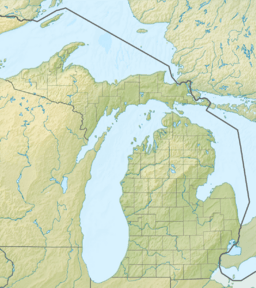Munro Lake facts for kids
Quick facts for kids Munro Lake |
|
|---|---|
| Location | Cheboygan County, Michigan |
| Coordinates | 45°36′56″N 84°40′58″W / 45.6155911°N 84.6827962°W |
| Type | Lake |
| Basin countries | United States |
| Surface area | 515 acres (208 ha) |
| Max. depth | 15 feet (4.6 m) |
| Shore length1 | 5.4 miles (8.7 km) |
| 1 Shore length is not a well-defined measure. | |
Munro Lake is a beautiful inland lake located in Cheboygan County, Michigan, which is right at the northern tip of Michigan's lower peninsula. An inland lake means it's completely surrounded by land, with no direct connection to the ocean.
This lake is an important part of the local water system. Its water flows into Douglas Lake, and then eventually into the East Branch Maple River. A large part of the land around Munro Lake is owned by the public. This area is part of the Mackinaw State Forest, which means it's protected and managed for everyone to enjoy.
Contents
About Munro Lake
Munro Lake is known for being a relatively shallow lake. This means it's not very deep compared to some other lakes. It gets its water mainly from underground sources, which is why it's called "groundwater-fed."
How Was Munro Lake Formed?
Like many lakes in Michigan, Munro Lake was shaped by huge sheets of ice called glaciers. Thousands of years ago, these glaciers moved across the land, carving out the dips and valleys that later filled with water to become lakes.
What Animals Live Here?
Munro Lake is a great home for many types of fish. You can find northern pike, bass, and various kinds of panfish swimming in its waters. These fish are an important part of the lake's ecosystem.
How Big is Munro Lake?
Munro Lake has a surface area of about 515 acres (208 ha). To give you an idea, one acre is roughly the size of a football field. So, the lake is quite large! Its shoreline, which is the edge of the lake where the water meets the land, stretches for about 5.4 miles (8.7 km). The deepest part of the lake is around 15 feet (4.6 m).
Protecting the Lake
Organizations like the Tip of the Mitt Watershed Council study lakes like Munro Lake. They help make sure the lake stays healthy and clean for the fish and other wildlife that live there, and for people who visit. Protecting our natural water sources is very important for the environment.
 | Jessica Watkins |
 | Robert Henry Lawrence Jr. |
 | Mae Jemison |
 | Sian Proctor |
 | Guion Bluford |



